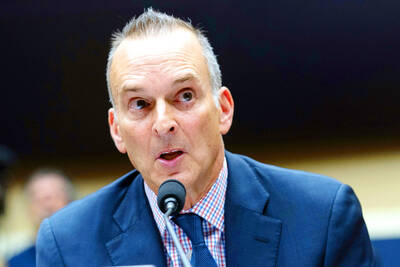Major League Baseball (MLB) on Monday pushed back its opening day until mid-May at the earliest because of the COVID-19 pandemic after the US government recommended restricting events of more than 50 people for the next eight weeks.
MLB commissioner Rob Manfred made the announcement following a conference call with executives of the 30 teams.
“The clubs remain committed to playing as many games as possible when the season begins,” the MLB commissioner’s office said in a statement.
The US Centers for Disease Control and Prevention on Sunday recommended that gatherings of 50 people or more be canceled or postponed across the nation for the next eight weeks.
“The opening of the 2020 regular season will be pushed back in accordance with that guidance,” Manfred said.
However, there is no telling at this point when games could start.
“We’re not going to announce an alternate opening day at this point. We’re going to have to see how things develop,” Manfred told the St Louis Post-Dispatch at a Cardinals camp in Jupiter, Florida.
He did not want to speculate about the possibility of playing in empty stadiums, saying part of that decision would depend on timing.
The MLB on Thursday last week called off the rest of the spring training schedule and said opening day, which had been scheduled for March 26, would be postponed for at least two weeks.
Teams and players agree that two to four weeks of additional spring training would be needed before the season begins.
“I’m just treating this as January of the winter time,” Arizona Diamondbacks catcher Stephen Vogt said in a text. “I am working out with the anticipation of baseball activities ramping up over the next month. But my mentality is back to preparing for the season.”
Under an agreement last week between the MLB and MLB Players’ Association (MLBPA), players are allowed to decide whether to stay at spring training or go home, but some teams have ignored that deal and told players to leave.
“There should be no organized activities in the camps,” Manfred told the Post-Dispatch. “We did agree with the MLBPA that spring training sites would remain open, but the thought there is with a skeleton crew, really to give players some place to use a gym, as opposed to being forced out into a public gym and the like.”
Any change to the 162-game schedule would necessitate bargaining with the MLBPA over an array of issues, including when and how much players get paid.
The league has not had a mass postponement of openers since 1995, when the season was shortened from 162 games to 144 following a seven-and-a-half-month strike by the players that also wiped out the 1994 World Series.
Opening day was pushed back from April 2 to April 26 and player salaries were reduced by 11.1 percent because of the games lost to the strike.
After a 32-day spring training lockout in 1990 caused opening day to be delayed a week until April 9, the season was extended by three days to allow each team a full 162-game schedule.
Baseball’s first strike lasted from April 1 to 13, 1972, and the season started on April 15.
The 1918 season was cut short because of World War I.
US Provost Marshal General Enoch Crowder announced a regulation on May 23, 1918, that men not involved in useful occupations appear before the draft board.
The US Department of War initially did not rule baseball was non-essential under the “work or fight” order, but US Secretary of War Newton Baker on July 26 announced that baseball had to comply by Sept. 1.
After negotiation, the season ended on Sept. 2 and the Boston Red Sox beat the Chicago Cubs in a World Series played from Sept. 5 to 11.

Revelations of positive doping tests for nearly two dozen Chinese swimmers that went unpunished sparked an intense flurry of accusations and legal threats between the World Anti-Doping Agency (WADA) and the head of the US drug-fighting organization, who has long been one of WADA’s fiercest critics. WADA on Saturday said it was turning to legal counsel to address a statement released by US Anti-Doping Agency (USADA) CEO Travis Tygart, who said WADA and anti-doping authorities in China swept positive tests “under the carpet by failing to fairly and evenly follow the global rules that apply to everyone else in the world.” The

Taiwanese judoka Yang Yung-wei on Saturday won silver in the men’s under-60kg category at the Asian Judo Championships in Hong Kong. Nicknamed the “judo heartthrob” in Taiwan, the Olympic silver-medalist missed out on his first Asian Championships gold when he lost to Japanese judoka Taiki Nakamura in the finals. Yang defeated three opponents on Saturday to reach the final after receiving a bye through the round of 32. He first topped Laotian Soukphaxay Sithisane in the round of 16 with two seoi nage (over-the-shoulder throws), then ousted Indian Vijay Kumar Yadav in the quarter-finals with his signature ude hishigi sankaku gatame (triangular armlock). He

RALLY: It was only the second time the Taiwanese has partnered with Kudermetova, and the match seemed tight until they won seven points in a row to take the last set 10-2 Taiwan’s Chan Hao-ching and Russia’s Veronika Kudermetova on Sunday won the Porsche Tennis Grand Prix women’s doubles final in Stuttgart, Germany. The pair defeated Norway’s Ulrikke Eikeri and Estonia’s Ingrid Neel 4-6, 6-3, 10-2 in a tightly contested match at the WTA 500 tournament. Chan and Kudermetova fell 4-6 in the first set after having their serve broken three times, although they played increasingly well. They fought back in the second set and managed to break their opponents’ serve in the eighth game to triumph 6-3. In the tiebreaker, Chan and Kudermetova took a 3-0 lead before their opponents clawed back two points, but

Taiwanese gymnast Lee Chih-kai failed to secure an Olympic berth in the pommel horse following a second-place finish at the last qualifier in Doha on Friday, a performance that Lee and his coach called “unconvincing.” The Tokyo Olympics silver medalist finished runner-up in the final after scoring 6.6 for degree of difficulty and 8.800 for execution for a combined score of 15.400. That was just 0.100 short of Jordan’s Ahmad Abu Al Soud, who had qualified for the event in Paris before the Apparatus World Cup series in Qatar’s capital. After missing the final rounds in the first two of four qualifier